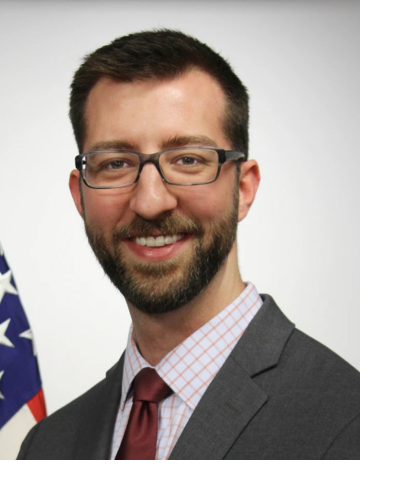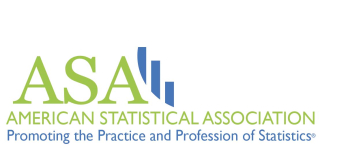Speakers
Reva Schwartz (NIST)
"Delivering trustworthy AI through risk-aware culture"
Kevin Tupper (Microsoft)
"Empowering your Statistics with Better Stories"
Travis Hoppe (CDC/NCHS & FCSM)
"Implementing generative AI at CDC"
Stephanie Lee Studds (US Census Bureau)
"Creative Use AI/ML at the Census Bureau"
Moderator
Bob Sivinski (OMB & FCSM)
Agenda
 Reva Schwartz
Reva Schwartz
Delivering trustworthy AI through risk-aware culture
Abstract: In this webinar Reva Schwartz will describe NISTs work in the area of Trustworthy and Responsible AI, including the AI Risk Management Framework and existing gaps in AI evaluation that make it difficult to generalize AI functionality to the real world.
 Kevin Tupper
Kevin Tupper
Empowering your Statistics with Better Stories
Abstract: In the realm of data-driven decision-making, the narrative crafted around statistical data often has a more significant impact than the data itself. "Empowering your Statistics with Better Stories" delves into this concept, focusing on how Generative AI can be instrumental in enhancing statistical storytelling. This presentation is designed to empower professionals in the statistical community with the knowledge and tools to utilize Generative AI in their data presentations. Attendees will learn the art of storytelling with data, understanding how to leverage
AI to make their findings more impactful and influential in decision-making processes within the government sector.
Kevin's talk will explore:
- Varied Narratives from Identical Data: An exploration of instances where identical sets of statistical data have led to different narratives, highlighting the influential power of storytelling in data interpretation.
- The Influence of Stories in Decision-Making: Discussing the critical role of narrative in guiding decisions, often taking precedence over the raw data.
- Enhancing Impact with Generative AI: Providing insights on how Generative AI can assist statisticians and data analysts in creating persuasive narratives that accurately convey their findings and engage their audience.
- Practical Examples: Presenting specific examples where Generative AI has effectively transformed statistical data into powerful and compelling stories.
 Travis Hoppe
Travis Hoppe
Implementing generative AI at CDC
In this talk, Travis Hoppe, Associate Director of Data Science and Analytics at the National Center for Health Statistics (NCHS), discusses the challenges faced in implementing generative AI at the Centers for Disease Control and Prevention (CDC). The talk highlights the importance of developing guidelines and managing adoption of AI within federal agencies and provides overview of the secure GenAI capabilities implemented within CDC's EDAV (Enterprise Data Analysis and Visualization) framework. The talk also delves into NCHS' involvement in responsible AI initiatives in the federal government, showcasing various AI activities and how the actions initiated within NCHS laid the groundwork for CDC’s current implementation.
 Stephanie Lee Studds
Stephanie Lee Studds
Creative Use AI/ML at the Census Bureau
The Census Bureau has launched several new initiatives with use of Machine Learning and Artificial Intelligence. The first project is our Construction Re-engineering initiative in 2019 with the goal of completely rethinking the way we measure construction activity. By leveraging new data sources, methodology, and data science techniques we are seeking to simultaneously increase program efficiency and product relevance. Since its inception, this initiative has spurred innovative solutions across multiple construction surveys. The Construction Progress Reporting Surveys now employ natural language processing (NLP) and machine learning techniques to classify construction project types, supplementing a previously entirely manual process. The Survey of Construction is exploring the application of machine learning to satellite imagery to detect and measure new housing starts. If successful, this modern approach to measuring of construction activity could decouple the program from existing collection cost and respondent burden constraints, allowing Census to deliver increased accuracy and geographic granularity to our data users. This presentation will discuss the development and progress of these solutions in support of the Census Bureau’s goal of reimagining federal statistics. The second project, is the use of Machine Learning to Redefine High Propensity Business Applications in the Business Formation Statistics.
About the Speakers

Reva Schwartz Reva Schwartz is a research scientist in the Information Technology Laboratory (ITL) at the National Institute of Standards and Technology (NIST) where she serves as Principal Investigator on Bias in Artificial Intelligence for NIST’s Trustworthy and Responsible AI program. Her research focuses on evaluating the societal impacts of AI systems, improving organizational practices, and driving understanding of socio-technical systems within computational environments. Her background includes a forensic science posting for almost 15 years at the United States Secret Service, a temporary duty assignment at the National Security Agency, and adjunct researcher at the Johns Hopkins University Human Language Technology Center of Excellence. She has advised federal agencies about how experts interact with automation to make sense of information in high-stakes settings.
 Kevin Tupper has over 20 years of experience in technology, spanning various sectors including startups, corporate businesses, and federal agencies. His focus is on making technology usable and effective for organizations, a principle he applies in his current role as Microsoft's Federal GenAI Evangelist. In this capacity, Kevin educates federal agencies on the practical applications of Generative AI and supports them in implementing this technology. Prior to this, Kevin led a team of Cloud Solution Architects at Microsoft, focusing on providing federal customers with secure and efficient cloud solutions. He also worked directly with several strategic U.S. Federal agencies helping them leverage data and AI for optimal results.Kevin holds a record of bringing value in his previous roles as well, including serving as Chief Technology Officer for multiple companies. Whether it's enabling millions of golfers to reserve tee times online or creating data warehouses capable of handling billions of responses, Kevin's expertise has proven beneficial across diverse applications. Kevin's talks are known for their straightforward approach, providing audiences with actionable insights on complex topics, all without the fluff.
Kevin Tupper has over 20 years of experience in technology, spanning various sectors including startups, corporate businesses, and federal agencies. His focus is on making technology usable and effective for organizations, a principle he applies in his current role as Microsoft's Federal GenAI Evangelist. In this capacity, Kevin educates federal agencies on the practical applications of Generative AI and supports them in implementing this technology. Prior to this, Kevin led a team of Cloud Solution Architects at Microsoft, focusing on providing federal customers with secure and efficient cloud solutions. He also worked directly with several strategic U.S. Federal agencies helping them leverage data and AI for optimal results.Kevin holds a record of bringing value in his previous roles as well, including serving as Chief Technology Officer for multiple companies. Whether it's enabling millions of golfers to reserve tee times online or creating data warehouses capable of handling billions of responses, Kevin's expertise has proven beneficial across diverse applications. Kevin's talks are known for their straightforward approach, providing audiences with actionable insights on complex topics, all without the fluff.
 Travis Hoppe serves as the Associate Director for Data Science and Analytics at the National Center for Health Statistics within the Centers for Disease Control. He leads research, development, and policy work on AI. Recently, his team enabled CDC to be the first federal agency to unilaterally deploy a generative AI model, ChatGPT, to all staff. Before his tenure at the CDC, Travis co-authored The Pile, a pioneering open-source dataset used for training large language models that served as a catalyst for promoting open science within the field of AI. He holds a PhD in Physics from Drexel University and served two post-docs at the National Institutes of Health. He serves as the CDC representative for the National Science and Technology Council (NSTC) for AI/ML, and is a standing member of the Federal Committee on Statistical Methodology (FCSM).
Travis Hoppe serves as the Associate Director for Data Science and Analytics at the National Center for Health Statistics within the Centers for Disease Control. He leads research, development, and policy work on AI. Recently, his team enabled CDC to be the first federal agency to unilaterally deploy a generative AI model, ChatGPT, to all staff. Before his tenure at the CDC, Travis co-authored The Pile, a pioneering open-source dataset used for training large language models that served as a catalyst for promoting open science within the field of AI. He holds a PhD in Physics from Drexel University and served two post-docs at the National Institutes of Health. He serves as the CDC representative for the National Science and Technology Council (NSTC) for AI/ML, and is a standing member of the Federal Committee on Statistical Methodology (FCSM).

Stephanie Lee Studds is the Assistant Associate Director for Economic Programs bringing with her over 24 years of experience in support of Economic and Enterprise Programs. She oversees the release of over a 100 indicator releases that come out monthly and quarterly as first measures of the health of the United States’ economy. Stephanie spearheaded the practice of smarter government by building a partnership between the Census Bureau and the St. Louis Federal Reserve to use their FRED mobile app when the America’s Economy mobile app reached its end-of-life. She also expanded EID’s efforts to use alternative data sources to supplement indicator surveys. She has been recognized for transforming data collection at the Census Bureau by being awarded multiple Department of Commerce Bronze Medals as well as a multiple Department of Commerce Gold and Silver Medals.
About the Moderator
 Bob Sivinski (OMB & FCSM) is a Senior Statistician within the Statistical and Science Policy Office at the U.S. Office of Management and Budget. He is also a member of the Federal Committee on Statistical Methodology (FCSM).
Bob Sivinski (OMB & FCSM) is a Senior Statistician within the Statistical and Science Policy Office at the U.S. Office of Management and Budget. He is also a member of the Federal Committee on Statistical Methodology (FCSM).
About the NISS/FCSM AI in Federal Government Series
The National Institute of Statistical Sciences (NISS) and the Federal Committee on Statistical Methodology (FCSM) are collaborating on a series of webinars on Artificial Intelligence (AI). The initial webinar took place on October 31, 2023 on AI in Federal Government: Uses, Potential Applications, and Issues. This series aims to benefit federal practitioners and managers by providing behind-the-scenes information on uses of AI in federal agencies and from insights on how agencies meet organizational, managerial, and ethical challenges in harnessing the power of AI. Participation by researchers and managers in the webinars can help streamline current efforts to adopt AI and inspire new endeavors. The NISS/FCSM webinar series creates unique opportunities not easily available through other forums or venues. Thank you to the American Statistical Association (ASA), NORC at the Univesity of Chicago, & RTI International for sponsoring of the series.
Event Type
- NISS Hosted
- NISS Sponsored
Host
Sponsor
Cost
Website
Location
Policy




